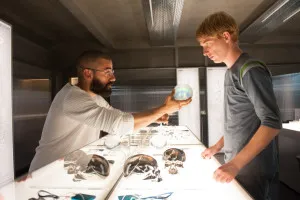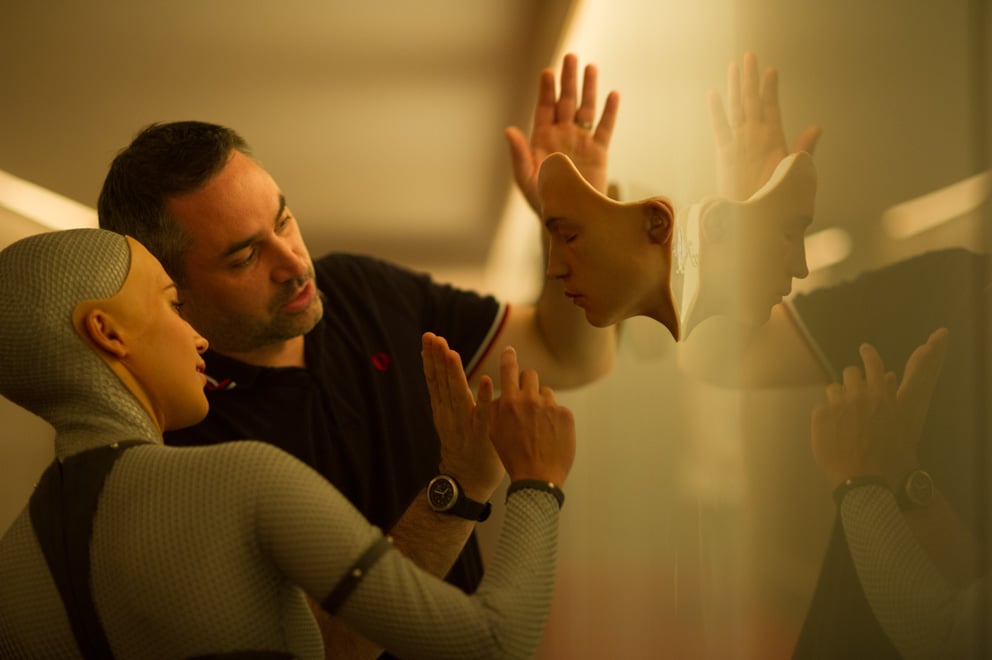Alex Garland first became a household name at the age of 26 when he published his debut novel, “The Beach.” A few years later, the book was adapted for the screen by Danny Boyle and made into a movie starring Leonardo DiCaprio. Ever since, Garland has been writing for the film industry, producing screenplays for both “28 Days Later” and “Sunshine.” Now, Garland is trying his hand behind the camera, making his directorial debut with “Ex Machina,” an artificial intelligence thriller, for which Garland also penned the script.
“Ex Machina” stars Domhnall Gleeson as Caleb, a programmer who arbitrarily wins a contest and is whisked away to a private estate owned by the reclusive Nathan (Oscar Issac), only to become unwittingly involved in a Turing test with Ava (Alicia Vikander), a sentient robot. “Ex Machina” hits theaters this Friday, so The Daily decided to sit down with the newly-christened director to talk genre preferences, science and the film’s “big ideas.”
The Stanford Daily (TSD): You work in science fiction a great deal, and I was wondering if you had a preference for the genre. Does working in science fiction allow you to explore themes you wouldn’t be able to explore in other genres?
Alex Garland (AG): I’m not sure I’d say it’s a preference, I mean, I work in whatever genre. I like genre films and I like working in genre — I’m happy to do anything really. I do like science fiction though, because it’s not really embarrassed about the bigger ideas. Even stuff like adult dramas are kind of embarrassed about big ideas. And sci-fi just gives you a license because, a lot of times, the people who are into sci-fi actually want big ideas.
TSD: Back when Kubrick was developing the project that would eventually become Steven Spielberg’s “A.I.,” he chose to delay the film because he didn’t think that a boy could realistically play a robot. With that in mind, why’d you choose to base the character Ava in what was essentially a physical performance?
AG: Because I think that if you didn’t do that what you’d be left with is — I mean, I’ll say, there’s two separate reasons. One of them is that for reasons to do with the plot, some of the themes, it’s actually important that she’s housed in the body of what appears to be a girl in her early twenties. That’s actually a function of the story and the themes. I mean, also I don’t personally believe that, at the moment, a fully animated character will give you the range that a really gifted actor can provide you with. So there is an extra set of reasons. I mean if in fact that Kubrick thing, if it’s true — ’cause it could just be bullshit — you know, for the sake of argument — if you assume it is true — you know, it’s still the case that you are going to get a more subtle, nuanced performance from an actor than you are from a fully animated creature.
TSD: You seem to go to great lengths to ensure the ambiguity of Ava’s intentions. In this regard, the film seems to be neither pessimistic nor optimistic about artificial intelligence. Was this your intent?
AG: The reason why it’s ambiguous about Ava’s intentions is more to do with some of the other themic [sic] aspects of the film, I’d say. My personal position is, I am optimistic about it. And the film is on Ava’s side. I mean, it is 100 percent on Ava’s side. That’s where it’s affiliated. I think if somebody read it as there [being] an implication that the machine is the antagonist, then they were misreading it.
TSD: Speaking of Ava, all the robots and prototypes are female, and, in this way, the female body becomes literally objectified. Was this a conscious choice? Or what was your intention?
AG: Yes. I mean, that’s a huge part of what is going in the film and what it’s about. So, yes, it’s totally conscious.
TSD: Could you elaborate on the reasoning behind this objectification of the female body?
AG: Well in order to answer that, I’d then be providing answers that should be more contained in the film. And part of the function of a film like this, kind of sci-fi I guess, is to pose questions. And in some instances provide answers in the film, as well. But it’s the film’s job to do that. And to sort of front-load it or back-load it within an interview sort of feels wrong.
TSD: Might I ask about the characterization of scientists within the film? Was the intent to play into the stereotype of the lone male scientist? Or were you trying to subvert this cliché?

AG: Well, I mean, basically, what I’ll tell you is that where I come from with regard to scientists is to my mind slightly different to the way they’re often perceived. It seems to me like scientists are often presented as being autistic, or having Aspergers or something a la “The Imitation Game,” which, I’m pretty sure, is not what Alan Turing was actually like anyway. So either you go that kind of route, or they’re presented as being the holders of truth, these dry truth-holders who refuse to listen to emotion. And maybe that’s actually related to the sort of “Aspergers-y” presentation.
And, in my experience, that is like a complete misrepresentation of what they’re like. They’re some of the most open-minded people I encounter. And one of the things that I like most about scientists, or at least good scientists, is that when they’re presented with evidence, strong evidence, that contradicts their position — what they do is they change their mind. And what the rest of us tend to do is ignore strong evidence and hold on to our positions in the face of whatever is thrown at us.
And the other thing about the scientist in the film is — you said earlier we’re not really sure what’s going on in Ava’s mind, but we’re also not sure what’s going on in his mind, because he may be exactly as he presents himself. Or he may not because his test relies on him being something predatory from which this robot needs to be rescued. So it’s in his interest to be perceived as being a bit predatory and a bit dangerous and a bit implicitly violent. You know, whacking a punchbag and that kind of thing. Is that him? Or is that how he wants to be perceived? Or is how he’s being perceived a sort of caricature of what he’s actually like? So that’s the kind of game in the film.
TSD: How do you decide what scientific facts are important to get right and what truths are okay to bend?
AG: I mean, to be honest, I don’t think any of the science is right in this. Because the science is dictating that A) we have a sentient machine, and B) we have a level of robotics that just doesn’t exist in the real world. At the moment, right now, there are no sentient machines, and there’s no robot construction of a human that could manage the incredible nuances of facial expressions. You could get a few of them right. But when you’re trying to get the full range, you don’t stand a chance. So in that respect, the science is a leap well beyond what science can currently do. The stuff to get right is not the science, it’s the ideas that surround the science and the arguments that surround the science.
TSD: On the subject of science and philosophy, Ava is often implicitly compared to a work of art within the film. Do you see a relationship between science and art?
AG: Yeah. There’s a very, very strong relationship between science and art. So I would say that, well, basically what I would say is this: We tend to make this division between science and art. Science is about knowledge and art is about emotion — the things that have the capacity to move us, right? And in my personal experience, I find that art can be about knowledge and science can be about emotion, and the two are interchangeable. I guess it depends on the person and it’s subjective.

But, broadly speaking, when I read about the nature of the universe or man, like say you’re just reading about the distances between us and the next nearest star system and the size of the galaxy. I was reading recently about how there’s a certain amount of evidence that all life on this plant is cellular, is built on cells. There’s a certain amount of evidence that all cells on this planet derive from one cell — literally, one cell. And I don’t mean a cluster of them, I mean one. Now when I think about that it kind of blows my mind and I have a response to it that’s similar to a piece of music or a painting or a movie. It gets my brain moving and I find it kind of moving and powerful and disturbing.
So, in that respect, I think that the difference, the line that’s drawn between science and art — I can understand it to an extent — but, in some respects, it’s misleading. And there’s much more in common between the two than people think.
TSD: There are a couple of references in the film to corporate and governmental surveillance. Was this an intelligent acknowledgement of recent developments regarding privacy and national security?
AG: No, because it was written before that happened. It was, in fact, it was weirder than that. One of the people that the film was submitted to, for finance and stuff like that, said, “The part of the film I find hard to swallow is the tech companies are checking us out while we’re on our mobile phones and stuff like that. And it’s just too paranoid.” I was kind of amazed. Like, you can buy a walking, talking robot but not that tech companies are gathering huge amounts of data?
The Snowden thing, when it came out, was one of the those revelations — and just to be really clear about it, I think it’s unbelievably important what that guy did, and the American government has been very, very slow issuing him full pardon, and actually what they should be doing is kind of apologizing and saying this is the kind of citizen we need to keep us honest, and all that kind of thing. When that revelation came, in some respects, it was just shock, and in other ways it wasn’t. I guess that’s why it was in the script and why it’s related to the incident.
TSD: The climate was already there?
AG: Sure.
Contact Will Ferrer at wferrer ‘at’ stanford.edu.
